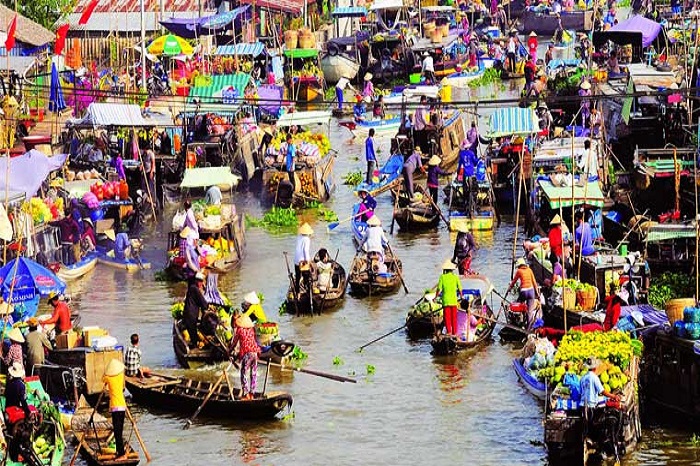
How to Visit the Mekong Delta: An Ultimate Travel Guide
- on Dec 1, 2019 By: Ngoc Nguyen
The Mekong Delta, renowned for its labyrinth of waterways, lush orchards, and abundant natural resources, is an emblematic region of southern Vietnam. Formed over thousands of years by alluvial deposits and variations in sea level, the Mekong Delta is today a sanctuary of biodiversity, home to numerous fauna and flora. The region is also a popular tourist destination, attracting visitors not only by its natural setting but also by its fascinating culture, showcased in various art forms, such as Don ca tai tu, Khmer dance and music.
In this article, Authentik Vietnam invites you on an adventure to explore the captivating Mekong Delta, uncovering what to do, where to visit, the best time to visit, and ideal itineraries to explore the region.
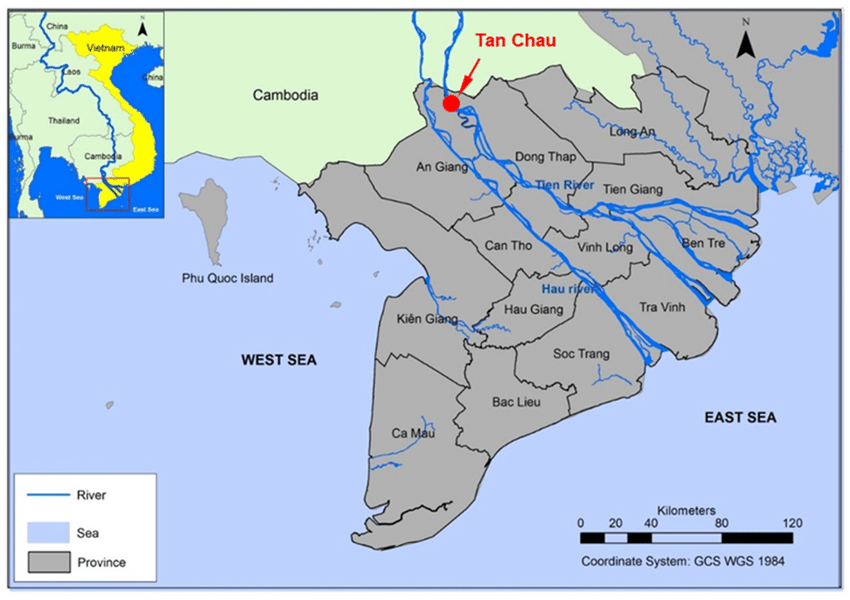
- My Tho: A haven of natural beauty
- Ben Tre: A peaceful escape in the heart of the Mekong Delta
- Can Tho: Capital of Southwest Vietnam, a mix of tradition and modernity
- Sa Dec: An authentic destination in the middle of the Mekong Delta
- Long Xuyen: An unspoiled getaway in the heart of the Mekong Delta
- Chau Doc: An Authentic Destination
- Tra Vinh: Hidden gem of southern Vietnam
Mekong Vietnam - An Inestimable Heritage of Southern Vietnam
A land at the crossroads of civilizations
First documented in writings relating to the ancient kingdom of Founan, Vietnam's Mekong Delta has been the scene of multiple cultural influences over the centuries. The Founan civilization, which flourished between the first and fifth centuries AD, bore indelible traces of Hindu and Buddhist culture. The Cham and Khmer peoples then settled here in the 7th century, leaving a deep imprint, notably with the expansion of Khmer civilization in the 9th and 10th centuries. By the end of the 15th century, the Vietnamese, fleeing conflict in more northerly regions, began to migrate southwards, marking the beginning of their presence in the delta.
The 17th century witnessed the arrival of Chinese refugees who fled the tyranny of the North, adding another cultural layer to this unique cultural pot. The Tay Son insurrection at the end of the 18th century also prompted many families to settle in this fertile land. As a result, this land is now characterized by a vibrant blend of Vietnamese, Chinese, and Khmer communities.
A rich and multifaceted culture
The Mekong Delta is marked by cultural diversity, forged by the harmonious coexistence of 44 different ethnic groups. This richness has given rise to a unique culture, handed down from generation to generation, and is a pillar of regional identity. Numerous cultural heritages, both tangible and intangible, have been recognized by UNESCO and the Vietnamese cultural authorities, including the art of Đờn ca tài tử, Cải lương, and traditional festivals, such as Ok Om Bok, Chol Chnam Thmay, and Sen Dolta. In addition, remarkable architectural structures such as Khmer Buddhist pagodas and ancient Vietnamese houses add to the richness of the regional heritage. The floating market, another emblematic feature of the region, illustrates the way of life and economic activities intimately linked to the waterways.
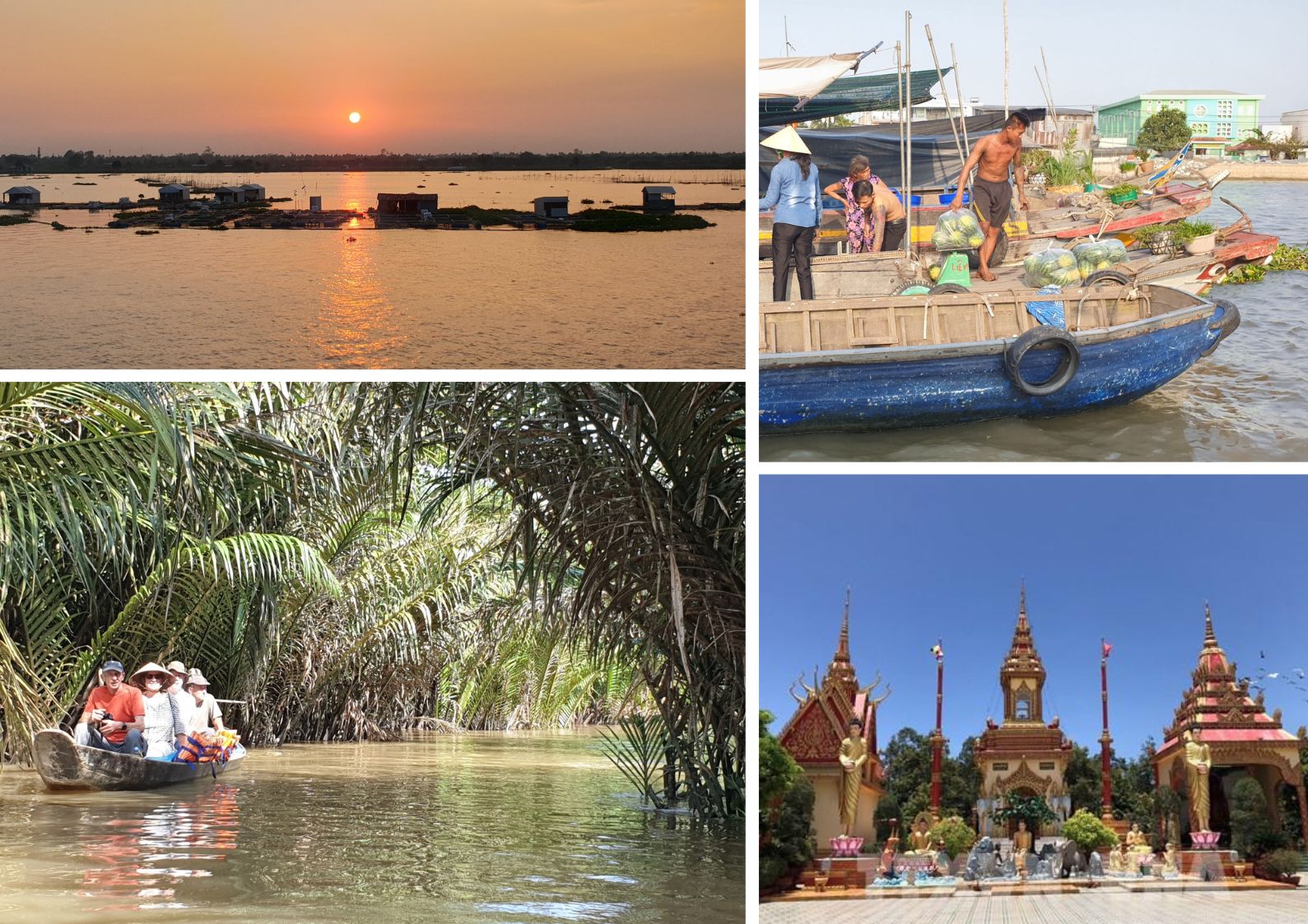
Southwestern Vietnam is the cradle of many folk art forms, among which Vong Co and Cai Luong hold pride of place. The region is also known for its Rom Vong dances, De Ke theater, and lyrical songs imbued with poetry. Songs on the water, such as hò đối đáp, hò chèo ghe, and hò mái đoản, are not only an expression of the generous and open spirit of the delta's inhabitants but also reflect the gentle and loyal character of the people of southern Vietnam. Each locality in the delta, from Dong Thap to Ben Tre, from Bac Lieu to Long An, brings its own nuances to these traditions, contributing to the region's cultural diversity.
Tourism potential enriched by community and nature
The Mekong Delta is an area of infinite potential for community and river tourism, benefiting from its rich ecosystem and spectacular natural landscapes. With a river network of over 28,000 kilometers, the Mekong Delta is not only Vietnam's largest rice-growing area but also an exceptional tourist destination. Mangrove forests such as U Minh Thuong and U Minh Ha, as well as small mountain ranges such as That Son and Sam, contribute to the diversity of landscapes, conducive to the development of ecological and community-based tourism.
River tourism in the Mekong Delta offers a deep immersion in local culture, notably through floating markets such as those in Cái Răng, Phụng Hiệp, and Ngã Bảy, where transactions take place directly on the boats. These experiences allow visitors to immerse themselves in the daily lives of the delta's inhabitants while discovering the subtleties of their way of life. In addition, visits to craft villages, such as the coconut candy-making village of Bên Tre, the flower village of Sa Dec, or the fish farms of An Giang, invite tourists to take part in local activities and bond with the communities.
The rich diversity of culture, religion, and customs among the Kinh, Hoa, Khmer, and Cham communities is a significant asset for the development of community tourism in the region. Traditional festivals such as Vía Bà Chúa Xứ and the Khmer's Óc Om Bóc, as well as art forms such as Đờn ca tài tử and Cải lương, are cultural attractions that fascinate visitors. By embracing and celebrating these cultural treasures, we can not only safeguard local identities but also develop distinctive and enriching tourism experiences that educate and inspire.
The integration of ecotourism and community-based tourism also offers sustainable economic benefits for local residents. The introduction of accommodation models, such as homestays and farm stays in orchards or flooded areas, brings employment and income opportunities for local communities while at the same time helping to protect the environment. If rationally planned and developed, this form of tourism could preserve traditional cultural values in tandem with fostering sustainable economic development, improving the quality of life of the delta's inhabitants.
What to do and see in the Mekong Delta?
My Tho: A haven of natural beauty
Nestled in the heart of the Mekong Delta, My Tho enchants visitors with its idyllic natural setting. Featuring peaceful rivers, vast rice fields stretching to the horizon, and lush orchards, My Tho is a perfect destination for nature lovers. Boat cruises on the Tien River invite travelers to delve into a serene atmosphere while taking in the picturesque scenery.
Dragon Island: A legend amid the river
Located in My Tho City, the Dragon Island, or Cồn Long, was formed from the alluvium of the Tien River. According to ancient folklore, this island was created by a mythical creature who gradually transformed it into a fertile land over time. Once a desert, Dragon Island is now renowned for its bountiful orchards, making it the most famous of the region's four islands.
Unicorn Island: An island steeped in history
Ten minutes by boat from Dragon Island, you will reach Unicorn Island, also known as Cồn Ly or Thoi Son Island. This is the largest island of the four islands: Dragon, Unicorn, Turtle, and Phoenix. Unicorn Island was the scene of many heroic events during the Vietnam War, earning its name a place in national history. In addition to its historical importance, however, Unicorn Island also captivates visitors with its stunning natural settings.
Turtle Island: Island of serenity
The smallest of the four islands, Turtle Island, or Cồn Quy, lies around 22 kilometers from Ben Tre. This island, together with the other three of the region, is named after the Four Holy Beasts in Vietnamese culture, reflecting the wish for peace and happiness of their inhabitants. Turtle Island is distinguished by its rustic charm and impeccably aligned rows of fruit trees. Visitors to the island can sample a variety of tropical fruits, such as rambutans, longans, and durians.
Phoenix Island: A blend of history and nature
Once a small island on the My Tho River, Phoenix Island, or CồnPhụng, has expanded in size thanks to the accumulated alluvium over the years. Known by many names throughout history, the island is mainly associated with the construction of the Nam Quoc Phat temple. According to a local tale, construction workers discovered an ancient bowl decorated with a phoenix, hence the island's current name, Phoenix Island.
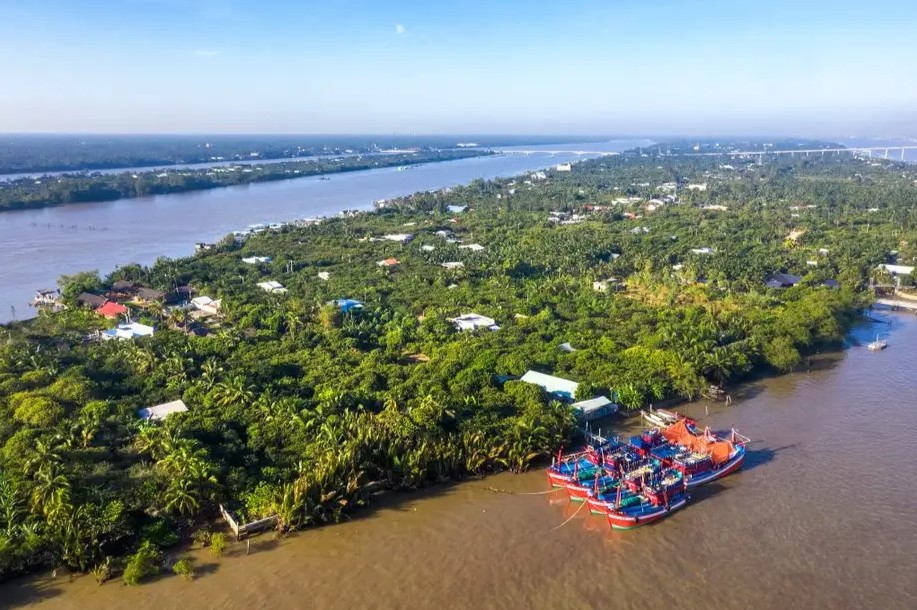
Accommodation in My Tho
Cuu Long Hotel
Address: 81-83, 30/4 Street, Ward 1, My Tho, Tien Giang
Located right in the center of My Tho City, this hotel offers comfortable rooms from 600,000 dong per night.
The Island Lodge
Address: 390 Thoi Binh, Thoi Son, My Tho, Tien Giang
Offering breathtaking river views and a peaceful setting, this establishment offers rooms between 1,000,000 – 6,000,000 dong per night.
Mekong My Tho Hotel
Address: 1A Tet Mau Than Street, Ward 4, My Tho, Tiên Giang
This 4-star hotel in My Tho offers comfortable rooms at prices ranging from 600,000 to 1,200,000 dong per night.
Ben Tre: A peaceful escape in the heart of the Mekong Delta
Unlike the bustling My Tho, Ben Tre Province is a haven of peace, ideal for those seeking tranquility. Located just 85 kilometers west of Ho Chi Minh City, Ben Tre is a lush green oasis surrounded by intricate waterways that beckons lovers of exploration and nature.
The fruit orchards: An immersive experience
The must-visit destinations are Cai Mon Orchard in Cho Lach District, Tien Long Orchard, and Tan Phu Orchard in Chau Thanh District. These locations invite visitors to plunge into a verdant setting, where they can pick and sample various kinds of fresh fruit right on the spot. Admission includes access to the orchard and unlimited fruit consumption on-site. Takeaways are also available for purchase.
Coconut Orchard: A visit to the very heart of local production
With over 200,000 households dedicated to coconut cultivation, Ben Tre is the center of coconut production in Vietnam. A bike ride through these plantations offers immersion in a soothing, tree-lined setting. Along the way, visitors can engage with residents, discovering the daily rural life in this iconic region of southern Vietnam.
Vam Ho Bird Sanctuary
The Vam Ho Sanctuary is a remarkable destination for witnessing over 100 species of birds, including some that are endangered. As a vital habitat for these fragile species, this site provides a unique opportunity to embrace the beauty of local biodiversity.
Nguyen Dinh Chieu Mausoleum
Located in An Duc Commune, Ba Tri District, this mausoleum honors Nguyen Dinh Chieu, one of Vietnam’s greatest poets and patriots, who is also renowned for his medical practice. Every July 1st, the people of Ben Tre hold a traditional festival in his honor, commemorating this illustrious son of the South.
Boat tours on rivers and canals
A boat trip is one of the best ways to discover Ben Tre. Navigating the winding rivers and coconut-shaded canals, you will be immersed in the daily life of the delta's inhabitants, punctuated by the comings and goings of barges laden with tropical fruits and other local produce.
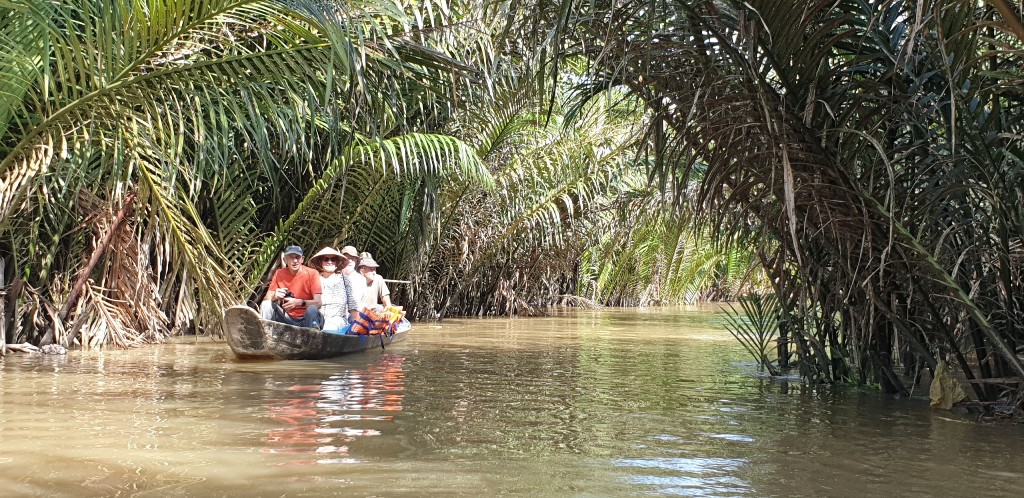
Cycling through the villages
Cycling is an ideal way to explore the picturesque villages of Ben Tre. As you pedal along coconut tree-lined paths, stop by and visit coconut candy-making workshops, meet local artisans, and chat with the local people, renowned for their warm hospitality.
Visit fruit orchards
Ben Tre is famous for lush fruit orchards, home to a variety of tropical fruits, such as durian, rambutan, longan, and pomelo. Not only does it enable you to taste these fresh fruits right from the trees, but a walk through these gardens also provides a better understanding of local farming techniques.
Sampan ride on the canals
For total immersion in Ben Tre's peaceful atmosphere, there's nothing like a sampan ride along the small canals lined with coconut palms. As you glide silently over the water, you'll discover a unique natural landscape where lush vegetation and calm waters create a setting conducive to relaxation and contemplation.
Accommodation in Ben Tre
These recent years, homestays have become increasingly popular in Bên Tre, offering travelers an immersive experience in local homes. Sharing a meal, interacting with locals, and discovering the culinary specialties of this river region is an authentic way to experience the everyday life of the locals. For those preferring more conventional accommodation, a variety of options are available in town, such as Ben Tre Riverside, the Mango Home Riverside, or Mekong Home Hostels. Coffee lovers will be delighted to enjoy a cup on the terraces of these hotels while admiring the picturesque streets along the rivers.
Cai Be – Vinh Long: Crossroads of the Mekong and Treasure of Southwest Vietnam
The Cai Be - Vinh Long region is a strategic crossroads of the Mekong Delta, where wholesale markets play a central role in the collection and redistribution of agricultural products such as fruit and rice. This lively area embodies the typical bustle of southwestern Vietnam, combining local tradition with dynamic trade.
Cai Be Floating Market
Located alongside the Nga Bay Floating Market in Hau Giang and Cai Rang Floating Market in Cai Rang, Cai Be Floating Market is one of the most popular floating markets in the Mekong Delta. As soon as the first light of the day appears, this iconic market comes alive in a distinctive scene featuring the exchanges between the locals, settling on their boats loaded with local produce. The panorama of boats filled with fruit, vegetables, and other produce gliding peacefully on the waters perfectly captures the very essence of Southern Vietnam.
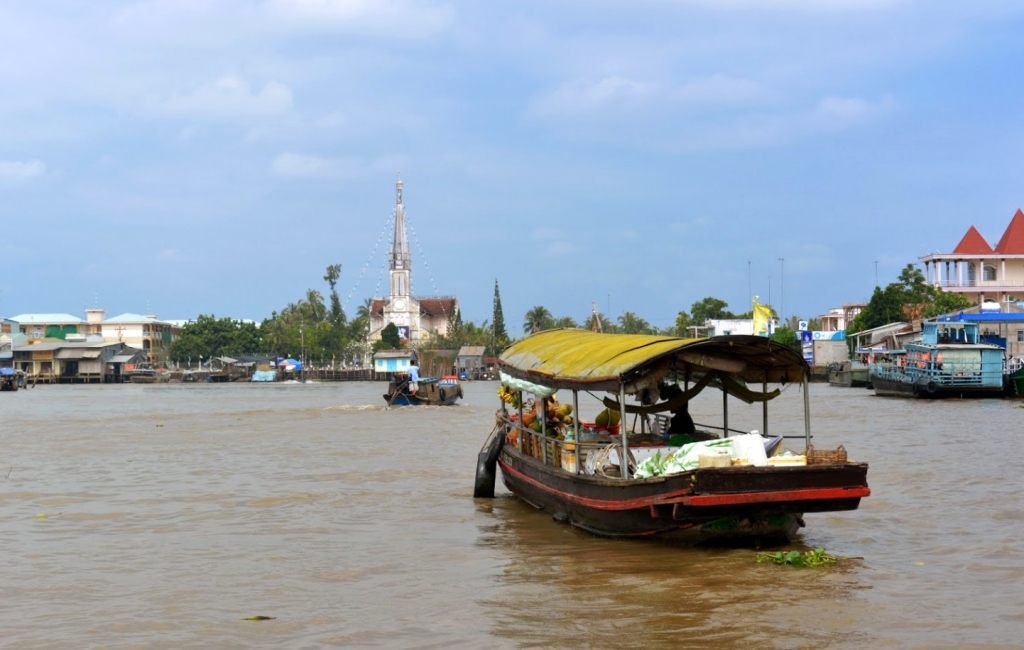
Cai Be’s fruit orchards: A fruit paradise in the heart of the Mekong Delta
Cai Be orchards, covering a vast area of 1,500 hectares along the Tien River, are a veritable oasis of greenery and fertility. Benefiting from rich alluvial soil and an ideal climate, these lands produce an abundance of exotic fruits such as rambutan, guava, durian, caimito, dragon fruit, and mango... As well as picking and tasting fresh fruit straight from the tree, visitors can immerse themselves in the local cuisine as they explore these orchards. Typical delta dishes such as grilled frogfish, lẩu mắm, or fried elephant fish are prepared with fresh ingredients at affordable prices, offering a gastronomic experience not to be missed.
Cai Be Church: A symbol of culture and religion
Cai Be Church is another jewel to discover in the region, recognized for its role in the spiritual life of the local people. Situated near the intersection of the three main branches of the Cai Be River, this church is surrounded by lush greenery, exuding a serene and refreshing atmosphere. Boasting impressive Romanesque architecture, this place of worship is distinguished by its majestic proportions, making it a major tourist attraction for visitors seeking a unique viewpoint or photographic souvenir.
Accommodation in Cai Be
Cai Be boasts a wide range of accommodation options to satisfy the needs of travelers seeking authenticity or comfort. Whether you prefer to stay in a homestay for total immersion in local life or in a hotel for greater convenience, Cai Be offers options to suit all tastes. Mekong Lodge and Mekong Rustic are among the top recommendations for a comfortable stay in Cai Be.
Can Tho: Capital of Southwest Vietnam, a mix of tradition and modernity
Nicknamed “Tây Đô” or the “Capital of the West”, Can Tho has been the pulse of southwestern Vietnam for over a hundred years. Set in the heart of the Mekong Delta, this iconic city balances economic prosperity with a rich cultural heritage of the river regions of the South. Despite rapid growth, Can Tho preserves its roots, treating visitors to a captivating blend of modernity and centuries-old traditions. Here are a few suggestions for fully exploring the treasures of this regional capital.
Cai Rang Floating Market: The Essence of the Mekong
No trip to Can Tho would be complete without a visit to the Cai Rang Floating Market, the region's jewel. Considered one of the largest and most authentic floating markets in Vietnam, Cai Rang Floating Market is the epitome of traditional trade on the water. From dawn, this market comes alive with a whirlwind of boats filled with fruit, vegetables, and other local produce. The best time to visit is between 5 and 7 a.m. when the market is in full swing. Located around 6 kilometers from the city center, the market is accessible by both land and river, making it a must-see excursion for those wishing to immerse themselves in the unique atmosphere of the delta.
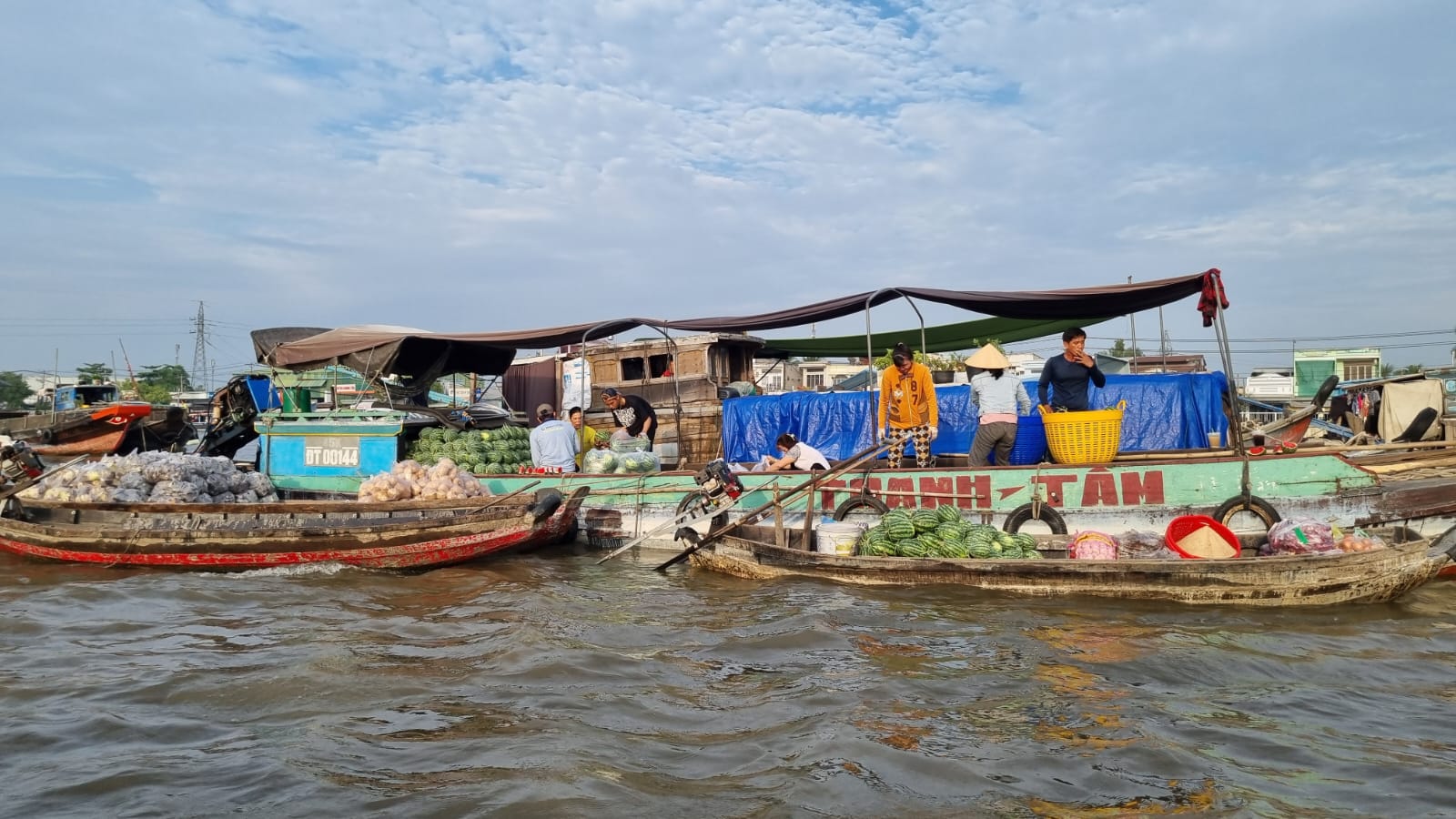
Binh Thuy Ancient House: Architectural witness from the 19th century
Just a few kilometers from the city center, on the banks of the Binh Thuy Canal, lies the Binh Thuy Ancient House, Southern Vietnam’s architectural masterpiece that perfectly embodies the fusion of European and Vietnamese architecture. While the exterior evokes an elegant French colonial residence, the interior reveals purely Vietnamese architectural elements, epitomizing the harmony between Eastern and Western cultures. This architectural heritage has gained notoriety through its appearance in several Vietnamese films.
Ninh Kieu Quay: river promenade in the heart of Can Tho
A visit to Can Tho’s famous Ninh Kieu Quay is a must. Located at the confluence of the Hau and Can Tho Rivers, this quay, transformed into a public park covering some 7000 m2, offers a breathtaking view of the Can Tho Bridge, which was once the longest shroud bridge in Southeast Asia in 2010. Being a popular spot for relaxation for locals and tourists, the Ninh Kieu Quay lights up at night, revealing all the city’s nocturnal splendor. For an even more immersive experience, visitors can take a river cruise to enjoy a unique perspective on the glittering cityscape.
Accommodation in Can Tho
Can Tho offers a variety of accommodation options to suit all budgets and preferences. Visitors can choose to stay in a downtown homestay for local ground immersion or opt for a luxurious riverside resort, such as the Azerai Can Tho Resort or the Victoria Can Tho Resort, with rates ranging from 1,200,000 to 5,000,000 dong per night. Although homestays are not as highly developed in Can Tho, hotels located near the Ninh Kieu Quay offer a convenient option for travelers. These establishments are ideal for easily exploring the city's main attractions and taking full advantage of Can Tho's vibrant life. Some hotels to choose from are:
Can Tho Ecolodge 4*
Nestled in the riverside of Ba Lang village, just a five-minute boat ride away from the Cai Rang Floating Market, the 4-star Can Tho Ecolodge is Can Tho’s first eco-tourism resort. This establishment consists of 12 bungalows housing 48 rooms, all boasting lush garden views, with wooden bathtubs and a modern Jacuzzi pool. Perfectly encapsulating the spirit of the Mekong Delta, Can Tho Ecolodge is ideal for travelers who wish to practice sustainable and responsible tourism,
Kim Tho Hotel 3*
The Kim Tho Hotel 3*, a true haven of peace and relaxation, offers an entirely new experience for its guests. Located just steps away from the city's main attractions, such as the Ong Pagoda, Ho Chi Minh Museum, and Can Tho Museum, this boutique hotel offers quality services, including 24-hour room service, free Wi-Fi access in all rooms, 24-hour security, and daily housekeeping. With 51 elegantly equipped rooms, including private lounges and mini-bars, as well as wellness facilities such as sauna, massage, and organized tours, Kim Tho Hotel remains an excellent choice for a pleasant and memorable stay in Cần Thơ. The Kim Tho restaurant serves Vietnamese meals throughout the day, with buffet options, while the bar welcomes you to enjoy refreshing drinks in a soothing musical atmosphere.
Ninh Kieu Riverside Hotel 3*
Located in Tan An District, the 3-star Ninh Kieu Riverside benefits from a privileged location, just 10.07 km from Can Tho International Airport and 1.77 km from Can Tho Port. In addition to its strategic location, this hotel is close to notable cultural sites such as the Huynh Thuy Le Ancient House less than 28.73 km away and Binh Thuy Temple less than 5.67 km away. The Ninh Kieu Riverside Hotel is therefore perfectly positioned for travelers wishing to explore the region's cultural riches.
Iris Hotel 3*
The 3-star Iris Hotel at 224, 30/4 Street, Ninh Kieu District, Can Tho, offers high-quality accommodation. This hotel offers easy access to local attractions, including the Binh Thuy Ancient House and Can Tho Beach, thanks to its strategic location. Hotel facilities include an indoor swimming pool and gym, providing the ideal setting for a comfortable and relaxing stay in the center of the city.
Sa Dec: An authentic destination in the middle of the Mekong Delta
Sa Dec, located in Dong Thap Province, is a must-see destination for travelers exploring the Mekong Delta. Renowned for its picturesque landscapes and rich cultural heritage, Sa Dec attracts many visitors thanks to its emblematic tourist sites, among which the Huynh Thuy Le Ancient House and the Thien Hau Temple stand out for their fascinating history and remarkable architecture.
Huynh Thuy Le Ancient House: A testimony of a forbidden love
The Huynh Thuy Le Ancient House, built in 1895, embodies a harmonious blend of Eastern and Western architecture, reflecting contemporary life with the fusion of cultures in Sa Dec. Located at 255A Nguyen Hue Street, this remarkable mansion is more than merely an old residence, but a witness to a famous love story between Huynh Thuy Le, a wealthy merchant of Chinese origin, and Marguerite Duras, the renowned French writer. Their love, marked by cultural and social differences, was immortalized in Marguerite Duras's novel “The Lover”, later adapted into a cult film appreciated worldwide.
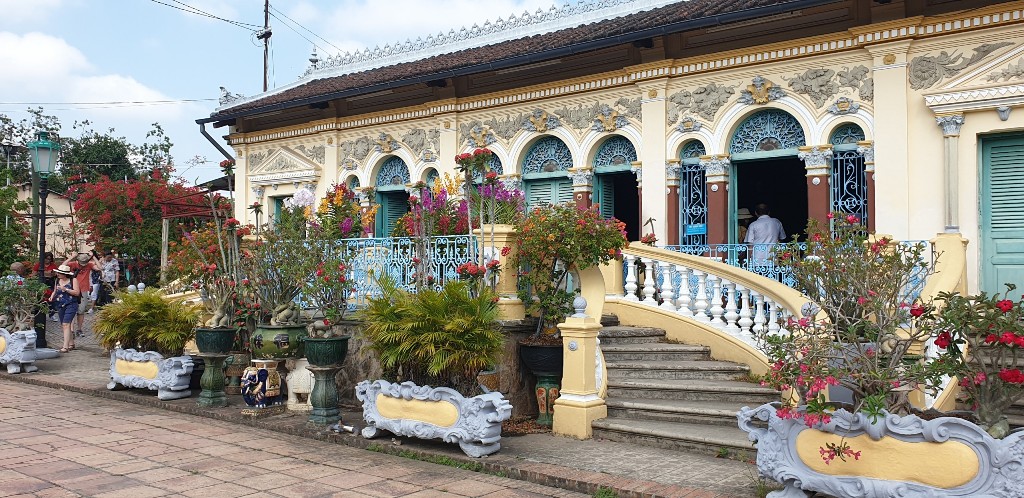
Thien Hau Temple
The Thien Hau temple, also known as the That Phu Thien Hau cung, is another must-see site in Sa Dec. Built in 1867 by Sa Dec's Chinese community, this temple is dedicated to Thien Hau Nguon Quan, patron goddess of sailors and sea fishermen. Located at 143 Trân Hung Ðao Street, the temple is distinguished by its typically Chinese architecture, with vast, open spaces and elaborate decorations that testify to the cultural richness of the region's Chinese-Vietnamese community. Important celebrations take place at the temple every year, particularly on March 23 and September 9, which are Thien Hau's birthday and commemoration, respectively. The Thien Hau temple is not only a place of worship but also a symbol of the spirituality and ancestral traditions still alive in the heart of the Mekong Delta.
Accommodation in Sa Dec
Long Xuyen: An unspoiled getaway in the heart of the Mekong Delta
Long Xuyen, located in An Giang Province, is a must-see destination for those wishing to discover the Mekong Delta from its most authentic angle. Far from the traditional tourist circuits such as Tan Chau or Chau Doc, Long Xuyen stands out for its peaceful atmosphere, picturesque landscapes, and the cultural richness of its inhabitants. This town, still untouched by mass tourism, is attracting more and more visitors keen to immerse themselves in local life, explore the region's gastronomy, and enjoy unique cultural experiences
Long Xuyen Floating Market
The Long Xuyen Floating Market is one of the liveliest symbols of the Mekong Delta culture. The market is accessible from Ngo Thi Nham Street and opens every day, including public holidays and traditional festivities. Unlike other floating markets in the region, the Long Xuyen market is relatively less touristy, allowing visitors to enjoy an authentic experience, fully immersed in the daily life of the locals. Boats laden with fruit, vegetables, fish, and other local produce offer a colorful and lively spectacle. Tourists can observe exchanges in a warm atmosphere and sample local staples at affordable rates.
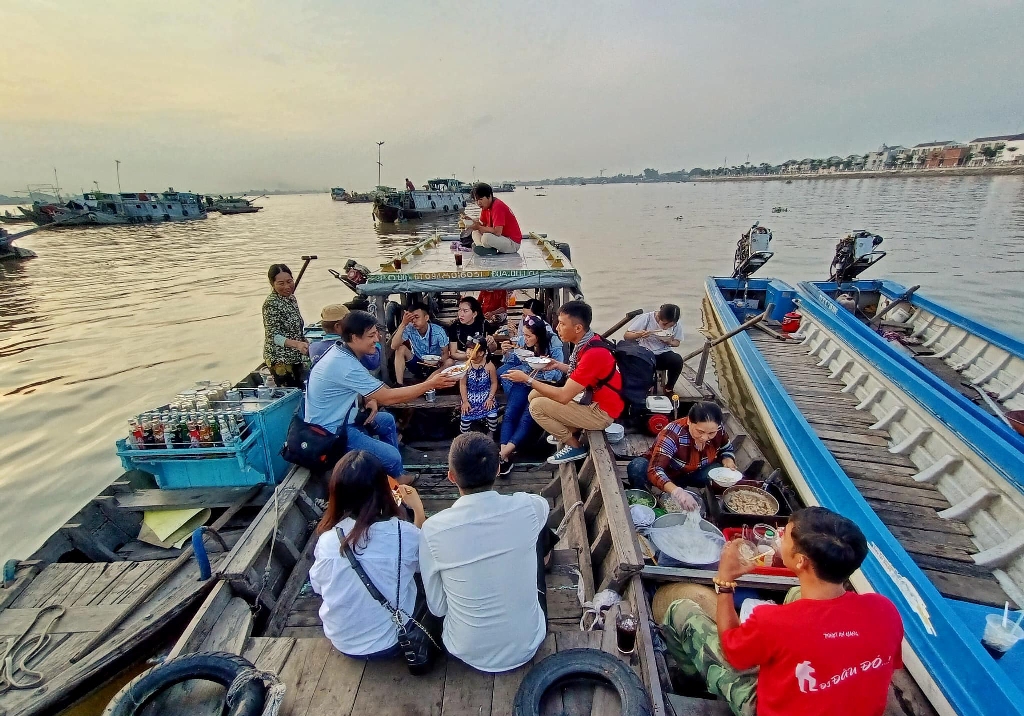
Tiger Island
Located around 4 kilometers from Long Xuyen city center, Tiger Island (Cu Lao Ong Ho), also known as My Hoa Hung, is a small island steeped in history and tradition. The island is approximately 8 kilometers long and 5 kilometers wide, surrounded by the calm waters of the Hau River and bordered by other small islands, such as Ba Hoa Island to the north and Pho Hue Island to the south. With a history of over 300 years, the island is home to families now in their fourth generation, descended from the first pioneers who migrated from Tien Giang to settle and farm this fertile land.
Accommodation in Long Xuyen
Long Xuyen offers a range of accommodation options to suit all tastes and budgets, from simple motels to elegant resorts.
Victoria Long Xuyen Hotel
This is one of Long Xuyen's most popular hotels. This luxury establishment offers modern comfort and quality service, with a breathtaking view of the Hau River. Thanks to its ideal location, it's within easy reach of the city's main attractions.
Hoa Binh Hotel 2
Hotel Hoa Binh 2 is just 1 km from Long Xuyen city center and 56 km from Can Tho International Airport. Close to Long Xuyen Cathedral, this establishment is ideally located for travelers wishing to explore the city.
Chau Khuong Hotel
Located in the heart of Long Xuyen, Hotel Chau Khuong is a three-star establishment built to international standards. The complex offers a full range of services, including a three-star hotel, restaurant, and café. Guests can also enjoy musical evenings on the hotel's upper floors, where they can admire the panoramic view of the city illuminated by thousands of twinkling lights. For more details:
Website: www.chaukhuonghotel.com
Email: chaukhuonghotel@gmail.com
Chau Doc: An Authentic Destination
Chau Doc in An Giang Province is a border city stretching along the Hau River's peaceful banks. The city is located some 210 kilometers east of Ho Chi Minh City, 110 kilometers from Can Tho, 50 kilometers north of Long Xuyen, and 150 kilometers from Phnom Penh. With its rich history and culture, Chau Doc is a must for anyone wishing to discover the wonders of the Mekong Delta.
Chau Doc Market
Chau Doc Market, often referred to as the “Kingdom of Mắm”, is a must-visit for any visitor to the city. As soon as you reach the market, the stalls of Mam (fermented fish paste) will catch your attention with their strong aromas. The variety of Mam is numerous, made from different fishes, such as ca tren, ca loc, ca linh, ca soc… Each follows different families’ recipes, handed down through generations, giving them unique flavors.
Pangasius Fish Statue
Just 200 meters from Chau Doc Market stands a statue of a pangasius fish, the signature fish of An Giang. Designed by sculptor Trân Thanh Phong, this 12-meter-high statue depicts a pangasius rising from the waves, in recognition of the importance of this species to the region. For nearly a century, the pangasius has contributed to the prosperity of many local families, becoming a symbol of wealth and stability. This monument honors not only the fish but also the communities that have built this industry.
Chau Doc Floating Village
Situated at the confluence of three rivers, the Chau Doc Floating Village is a sight to behold. Conceived as a tourism project by the An Giang Trade and Investment Promotion Center, this colorful village is made up of 161 floating houses, each painted a different color, creating a floating rainbow over more than a kilometer in length.
Ba Chua Xu Temple
Five kilometers from downtown Chau Doc, at the foot of Sam Mountain, lies the Ba Chua Xu Temple, a sacred site that gathers pilgrims praying for peace and prosperity. The Via Ba Chua Xu Festival, celebrated every year from the 23rd to the 27th day of the 4th lunar month, is an important event of the region, commemorating the first Vietnamese to settle in An Giang, as well as Ba Chua Xu's efforts to protect and enrich the land.
Thoai Ngoc Hau Mausoleum
The mausoleum of Thoai Ngoc Hau, located near Sam Mountain, represents the traditional architecture of the Nguyen dynasty. Classified as a national historic monument in 1997, the site pays homage to Thoai Ngoc Hau, a governor who contributed greatly to the development and defense of An Giang Province.
Hang Pagoda
The Hang Pagoda, nestled on the slopes of Mount Sam, is another spiritual landmark for visitors to Chau Doc. Surrounded by majestic mountains and flourishing flowers, this pagoda is a place of serenity and contemplation. The pagoda complex, with its traditional red-roofed architecture and intricately carved columns, presents various scenic highlights, including a lotus pond, a troglodyte path, and a stone-paved courtyard.
Tra Su Cajuput Forest
The Tra Su Cajuput Forest, located 30 kilometers from Chau Doc city center, is one of the most popular destinations in the Mekong Delta. This wetland, representative of the region, plays a crucial role in regulating water and the local climate. It is also home to a rich biodiversity, with many rare plant and animal species. During the high-water season, the landscape becomes enchanting, with carpets of duckweed covering the canals and water birds flying over the trees.
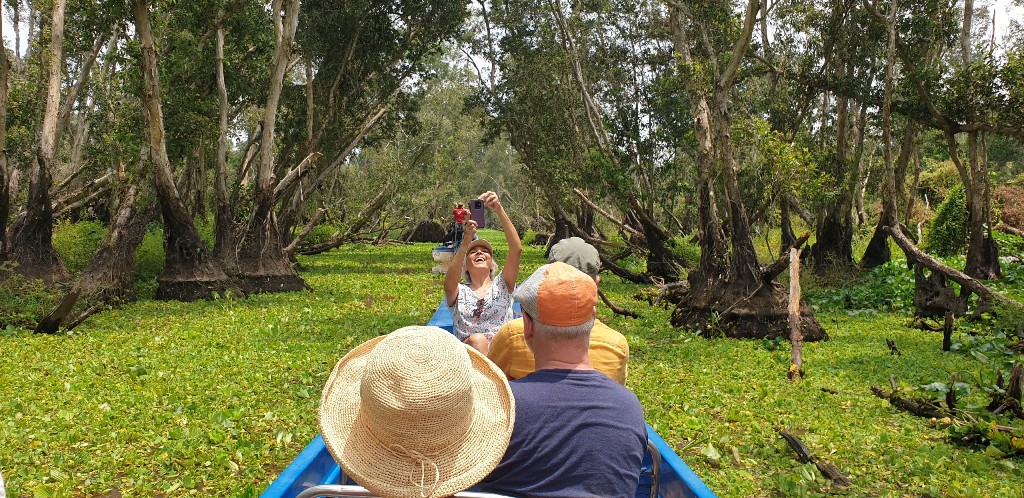
Cham Village
A visit to the Cham Village is, undoubtedly, not to be missed. Located just 10 minutes by boat from the city center, this village is home to a Cham community that has preserved its cultural and religious traditions. Strolling through the village, visitors can admire the stilt houses and mosque and discover the local handicrafts and distinctive Cham cuisine.
Accommodation in Chau Doc
Chau Doc offers a wide range of accommodations to suit all budgets, from economy hotels to luxury establishments. Among the most prestigious addresses are the Hotel Victoria Chau Doc and the Victoria Nui Sam Lodge. The latter is particularly prized for offering one of the finest sunset views in the entire Mekong Delta, an unforgettable experience for visitors.
For travelers on a more modest budget, Chau Doc also boasts many three-star hotels. The Chau Pho Hotel 3* and the Hung Cuong Hotel 3* are among visitors’ favorites for offering excellent value for money while guaranteeing a comfortable stay.
Tra Vinh: Hidden gem of southern Vietnam
Just a few hours' drive from the hustle and bustle of Saigon, Tra Vinh opens up to travelers as a gateway to little-known natural and cultural treasures. This region of southern Vietnam, rich in history and tradition, has been the setting for many famous films, attracting the attention of filmmakers and curious tourists.
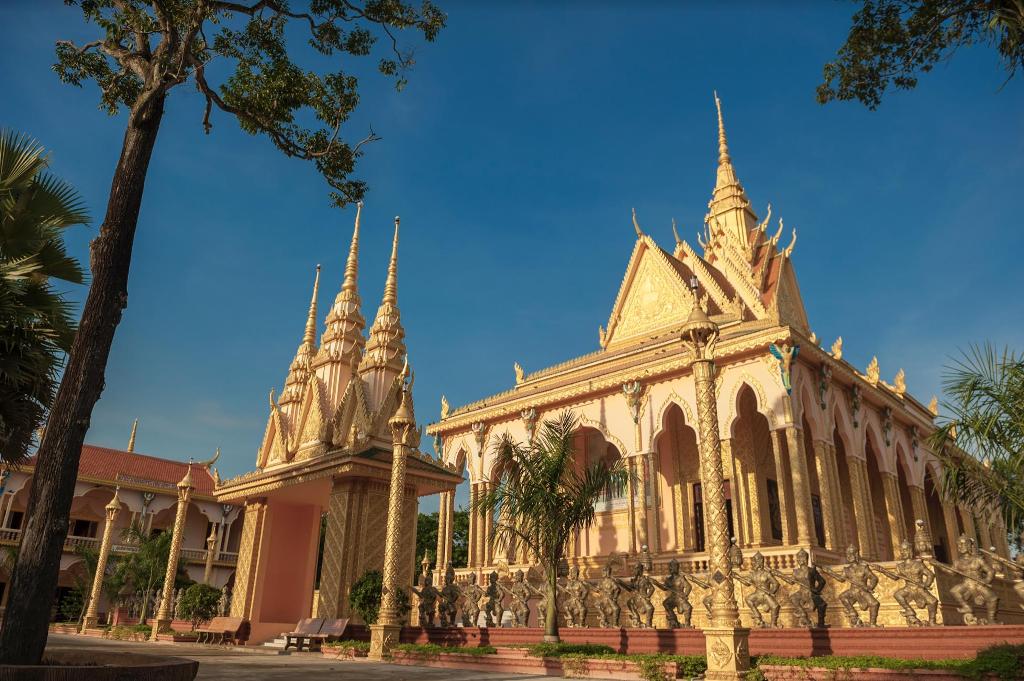
Ba Om Pond
Address: Next to National Highway 53, Ward 8, Tra Vinh City
Characterized by its soothing atmosphere, Ba Om Pond is a veritable oasis of tranquility in Tra Vinh. This complex of lakes and lush greenery stretches 300 meters wide and 500 meters long, surrounded by sand dunes and ancient trees. Visiting Ba Om Pond offers a chance to recharge in nature and immerse yourself in the unique culture of the Khmer people.
Mangrove Forest
Address: Long Khanh Commune, Duyen Hai District, Tra Vinh
The mangrove forest is a typical example of the coastal forests of southern Vietnam. Over 20 years old and covering an area of 200 hectares, this nature reserve is home to a variety of fauna, including endangered species. As visitors navigate its canals, they can observe this unique biodiversity at close quarters while sampling Tra Vinh's culinary specialties, renowned for their authentic, rustic flavor.
Tan Quy Island
Address: An Phu Tan Commune, Cau Ke District, Tra Vinh
Tan Quy Island is a must-see destination for those seeking to discover the natural charms of Tra Vinh. Located less than 50 kilometers from the city center, this island is renowned for its lush orchards and unique leisure activities. Covering an area of 929 hectares, Tan Quy Island offers visitors a fresh atmosphere and diverse landscapes. As well as picking fruit directly from the orchards, travelers can enjoy cycling, sailing, or swimming in the waters of the Mekong.
Déjà Vu Huynh Kha
Address: Bach Dang Street, Ward 4, Tra Vinh
The Déjà Vu Huynh Kha ecotourism offers a range of leisure and relaxation activities, including playgrounds, restaurants, and relaxation areas. Inside this 80,000 m² area, visitors can participate in board games, dances, and fitness sessions as well as sample local culinary specialties.
Ang Pagoda
Ang Pagoda is an integral part of Tra Vinh’s Khmer heritage and is also the oldest pagoda in the region. Boasting traditional architecture, it houses sculptures and frescoes illustrating Buddhist legends and Khmer deities. The pagoda is also an important cultural center, hosting major traditional festivals such as Chol Chnam Thmay (Khmer New Year), Ok Om Bok (Moon Festival), and Dolta (Ancestors' Festival).
Museum of Khmer Ethnic Culture
Address: Nguyen Du Street, Ward 8, Tra Vinh City
For culture and history enthusiasts, the Museum of Khmer Ethnic Culture is a must-visit site in Tra Vinh. This museum preserves and exhibits numerous objects that record the daily life, beliefs, and rituals of the Khmer people of the Mekong Delta. Surrounded by verdant gardens, the museum is a peaceful place that invites discovery and reflection.
Ba Dong Beach
Featuring crystal-clear water and vast stretches of fine sand bordered by lush forest, Ba Dong Beach is one of Tra Vinh’s natural gems. Visitors can soak up the sea air in a relaxing setting and explore the surrounding sites, such as the Long Toan Bridge and Kinh Xang Canal.
Accommodation in Tra Vinh
Travelers looking for peace and comfort can find a variety of lodging options in Tra Vinh. Bich Ngoan Hotel at 17/22 19/5 Street offers modern rooms overlooking a verdant park, while My Cang Residence, at 251 30/4 Street, Long Duc Commune, seduces with its warm welcome. For those seeking a nature retreat, Mekong Garden Bungalow is an ideal choice. Finally, Tra Vinh Lodge and Homestay Suonsia provide a serene setting, perfect for local cultural discoveries.
Recommended itineraries for discovering the Mekong Delta
The Mekong Delta promises a variety of captivating experiences. Here are a few itinerary ideas to make the most of this fertile region, tailored to the length of your stay.
Delta Mekong Day Tour
Option 1: Ho Chi Minh City - Ben Tre - Ho Chi-Ville (85 km x 2)
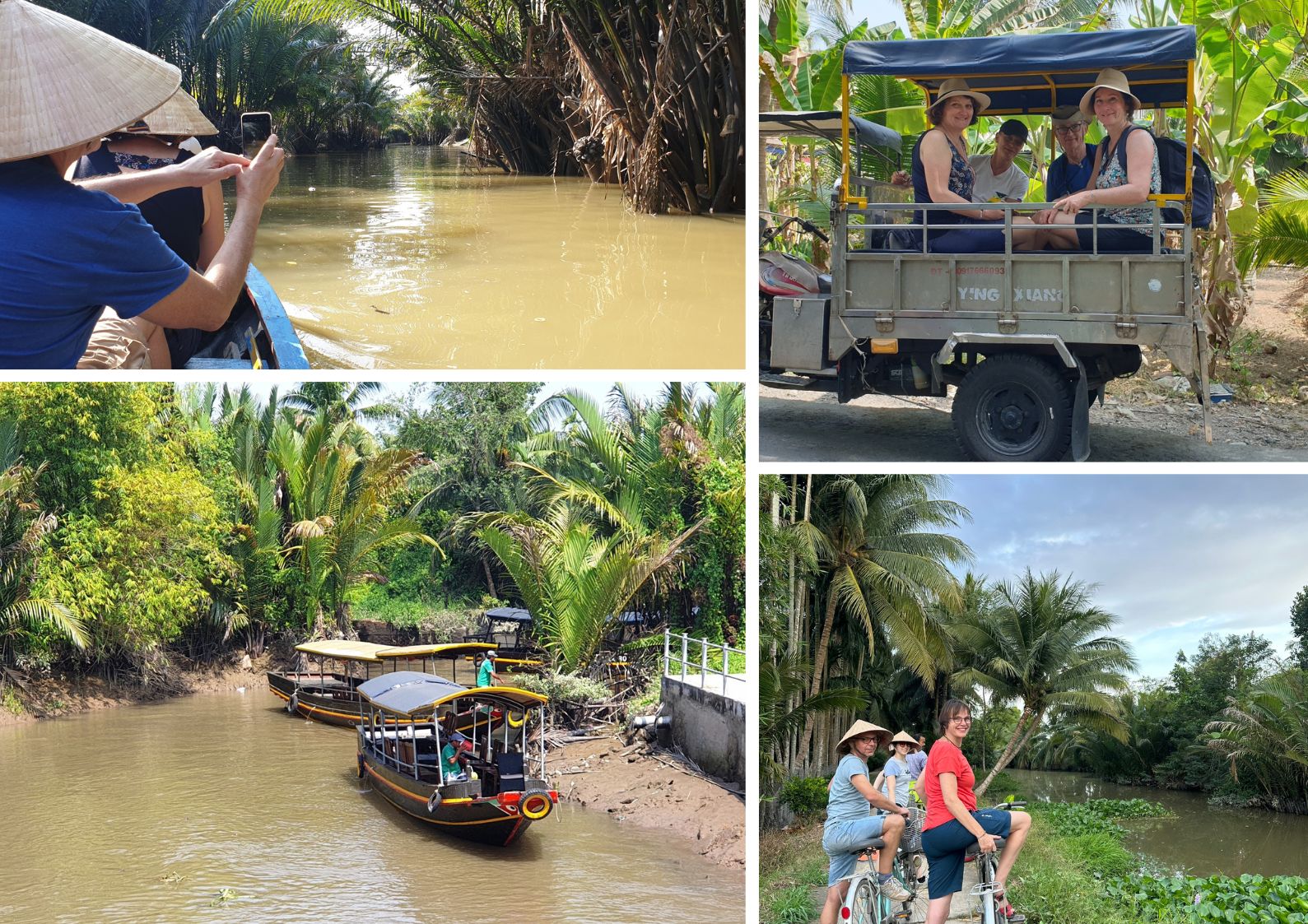
For a day trip in the Mekong Delta, opt for Ben Tre, nicknamed the coconut capital of Vietnam, for an immersive experience in the tranquility of Vietnamese rural life. Here is our suggested itinerary:
Departure: From Ho Chi Minh City, take a 2-hour ride to reach Ben Tre.
Arrive in Ben Tre: Once arrive, make your way to the Phong Nam pier for a boat trip on the Chet Say River. Enjoy the picturesque river scenery and discover local life by visiting an artisanal brick kiln, a coconut processing workshop, and a coconut charcoal kiln. Along your way, sample some local fruit.
Boat trip: Continue your discovery by exploring the Cai Son canals before taking a tuk-tuk or bicycle ride through the villages to admire the coconut groves, rice fields, and lush orchards.
Lunch break and sightseeing: After lunch, take a rowboat ride along the tree-lined canals to the Mai An Tiem pier.
Return: Return to Ho Chi Minh City at the end of the afternoon.
Option 2: Ho Chi Minh City - My Tho - Ho Chi Minh City (65 km x 2)
If you have less time, My Tho, 65 km from Ho Chi Minh City, is an excellent option for exploring the treasures of the Mekong Delta during the day. Expect that this region will be slightly more touristy.
Departure: Start from Ho Chi Minh City and head for My Tho, the capital of Tien Giang Province. Visit the Cao Dai Temple, a unique religious center in Vietnam that combines Buddhism, Taoism, Confucianism, and Catholicism.
Boat excursion: Embark on a boat trip through Dragon, Unicorn, Phoenix, and Turtle Islands to gain insight into local life and take in the serenity of the delta. Visitors are free to make stops for sightseeing and taking photos.
Village visit: Taste seasonal fruits and listen to traditional music. Take a horse-drawn carriage ride to Ben Truc and taste local honey, nicknamed Mekong whisky.
Boat trip: The journey in the delta ends with a boat trip on the Vam Chua canal. Have lunch at a local restaurant before returning to Ho Chi Minh City in the afternoon.
Delta Mekong 2-Day Tour
Journey: Ho Chi Minh City - Ben Tre - Can Tho - Ho Chi Minh City
For a more in-depth experience of the Mekong Delta, this two-day tour invites you to explore Can Tho, the region’s largest city.
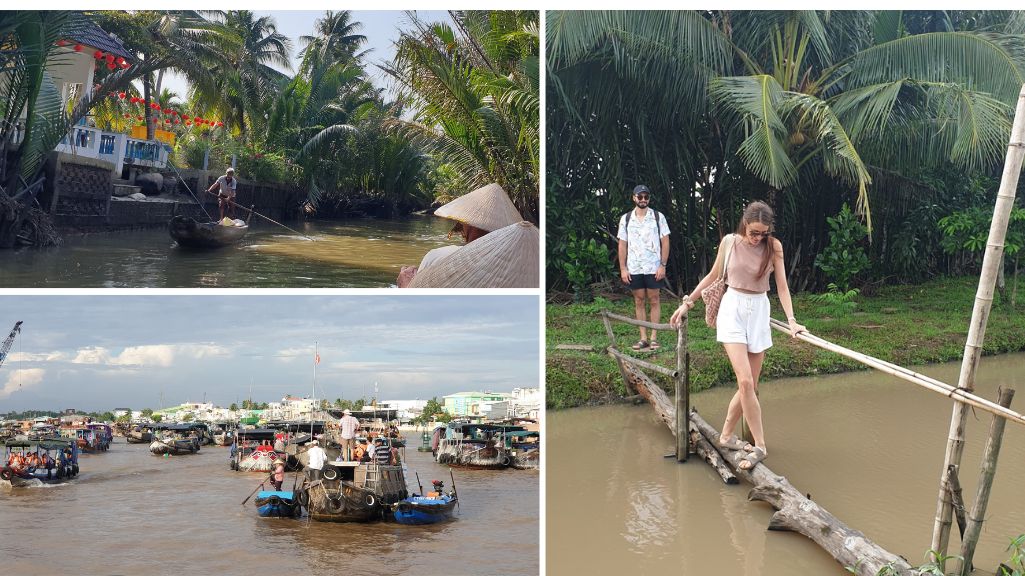
Day 1: Ho Chi Minh City - Ben Tre - Can Tho (85 km + 120 km)
Begin your adventure in Ben Tre, following the day tour itinerary mentioned above, then head for Can Tho. On arrival in the late afternoon, settle into comfortable accommodation for a restful night, before continuing your explorations the following day.
Day 2: Can Tho - Cai Rang Floating Market - Ho Chi Minh City (About170 km)
Morning: Start the day by visiting the Cai Rang Floating Market, a must-visit in the delta. Marvel at the vibrant spectacle of hundreds of boats loaded with seasonal fruits such as watermelons, dragon fruit, durians, coconuts, mangoes, bananas, and pineapples, as well as aquatic produce and local vegetables.
Boat excursion: Continue your exploration with a boat trip through the region's winding canals. Discover a local fruit garden and visit the An Binh market.
Cultural visit: End your tour with a visit to the Binh Thuy orchid house, famous for its distinctive architecture and fascinating history.
Return: In the late afternoon, return to Ho Chi Minh City with a wealth of memorabilia from your time in the Mekong Delta.
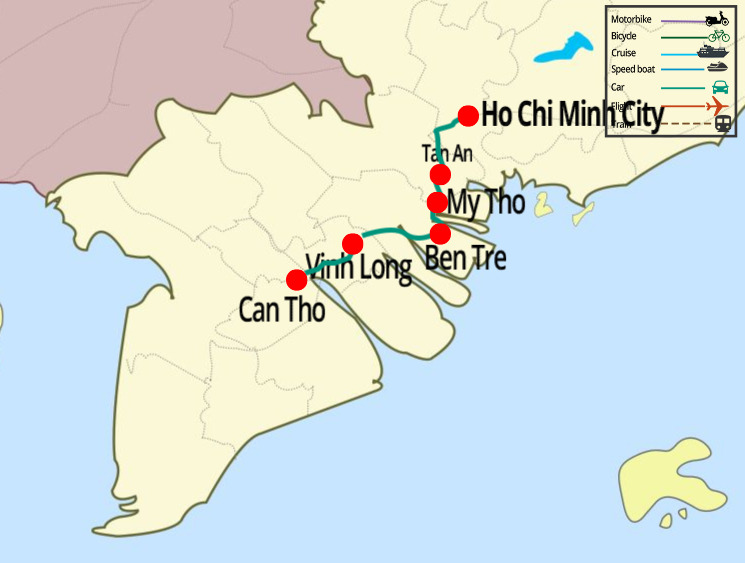
Delta Mekong 3-Day Tour
Journey:Ho Chi Minh City - Ben Tre - Sa Dec - Long Xuyen - Ho Chi Minh City
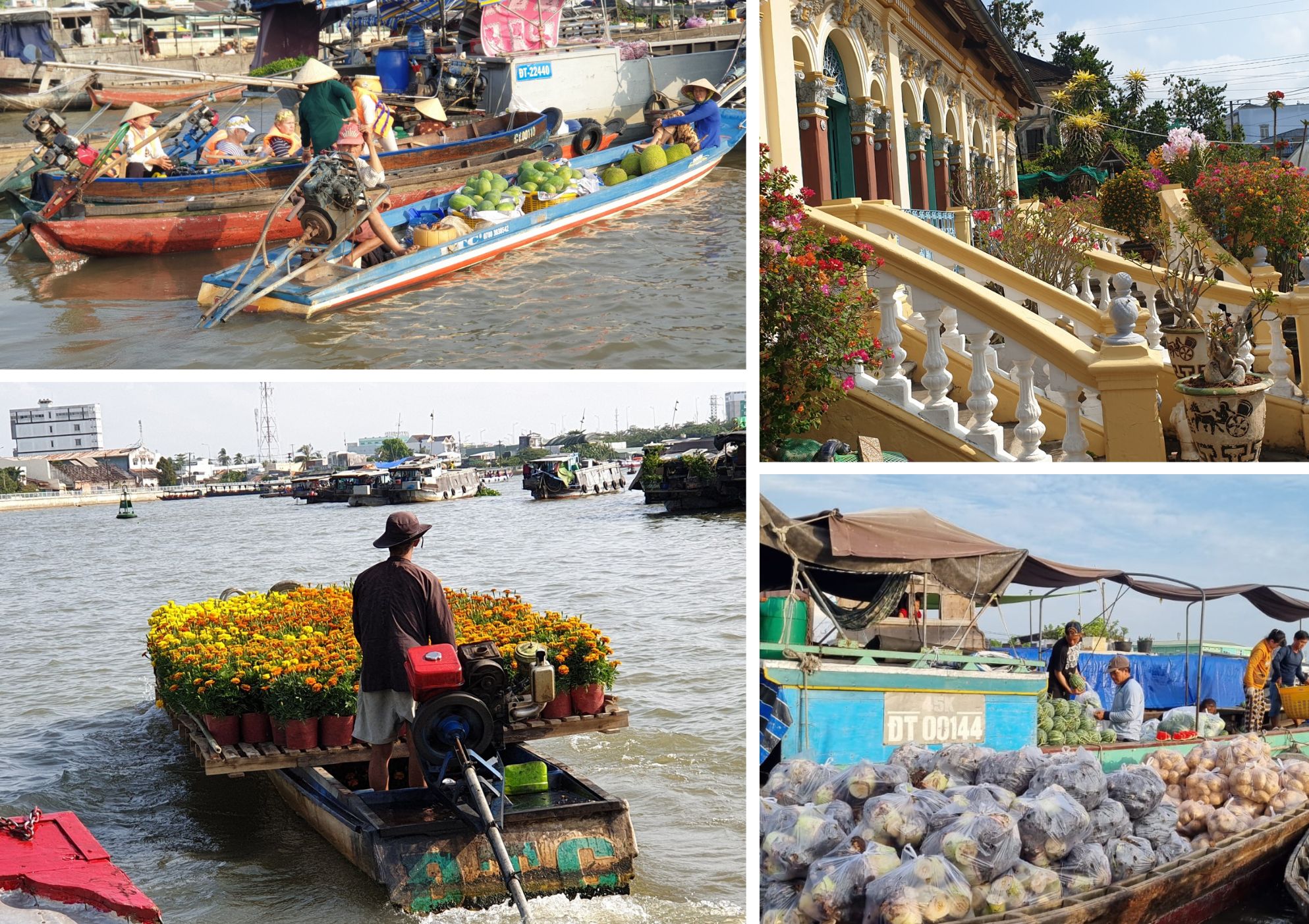
A three-day tour of the Mekong Delta offers a complete immersion in this fascinating region’s culture and varied landscapes. Here's an itinerary to maximize your experience.
Day 1: Ho Chi Minh City - Ben Tre - Cai Lay (85 km + 40 km)
Start your journey by exploring Ben Tre, following the itinerary mentioned above. Then head to Cai Lay and spend the night in a local home. Enjoy a convivial evening sharing authentic experiences with your hosts, including preparing local dishes.
Day 2: Cai Lay - Sa Dec - Long Xuyen (90 km)
Morning: After breakfast, ride through the verdant fields from Dong Hoa to Tam Binh by bike and discover the region's lush orchards.
Noon: Continue your journey to Long Xuyen with a visit to Sa Dec. In Sa Dec, visit the local market, the Kien An Cung pagoda, and the Huynh Thuy Le Ancient House, made famous by Margurite Duras’s famous novel “The Lover”.
Afternoon: In Long Xuyen, explore Cao Dai Temple and visit a crocodile farm before settling into your accommodation in the late afternoon.
Day 3: Long Xuyen - Floating Market- Ho Chi Minh City (185 km)
Morning: Wake up early for a visit to Long Xuyen Floating Market, a lively hub for traders from all over the region. Admire the scene of hundreds of boats loaded with fresh fruit and seasonal vegetables.
Noon: Take a cycling or walking tour around Cu Lao Ong Ho Island, known for its picturesque scenery and tranquil atmosphere.
Afternoon: After lunch, head back to Ho Chi Minh City with unforgettable memories of your Mekong Delta adventure.
Delta Mekong 4-Day Tour
Journey: Ho Chi Minh City – Ben Tre- Tra Vinh – Sa Dec – Long Xuyen – Tra Su – Chau Doc – Ho Chi Minh City
This itinerary, designed for those with more time, allows in-depth immersion in the authenticity of the Mekong Delta, revealing its hidden treasures at every stage.
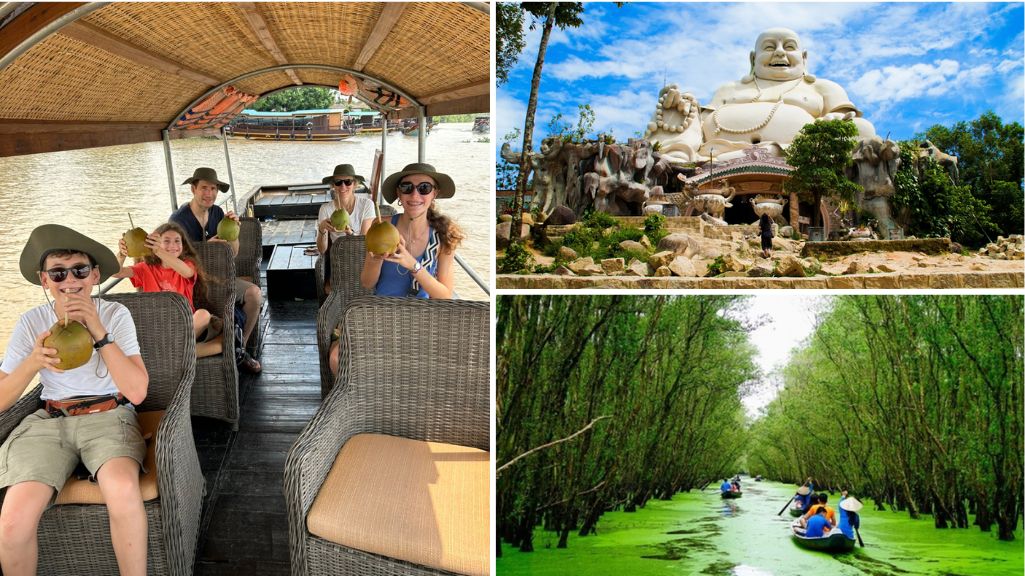
Day 1: Ho Chi Minh City – Ben Tre – Tra Vinh (85 km + 40 km)
After exploring Ben Tre as suggested in the previously proposed program, hit the road to get to Tra Vinh. This region, steeped in Khmer culture, welcomes you in the late afternoon. Spend the night with Khmer inhabitants, an immersive experience that will bring you closer to local life.
Day 2: Tra Vinh – Sa Dec- Long Xuyen (110 km)
Morning: Start the day with a bike ride through nursery gardens and picturesque Khmer villages. This ride will give you a unique insight into the daily life and hospitality of the local people. Don't miss a visit to a Khmer pagoda before continuing to Sa Dec.
Noon: While in Sa Dec, explore the Kien An Cung Pagoda, the famous Huynh Thuy Le Ancient House, rendered immortal by Marguerite Duras' novel “The Lover”, and stroll through the town's bustling market.
Afternoon: The journey continues as you head to Long Xuyen. On the way, stop to visit Cao Dai Temple and a crocodile farm. Long Xuyen welcomes you by late afternoon.
Day 3: Long Xuyen – Tra Su – Chau Doc (56 km)
Morning: Wake up early to visit Long Xuyen Floating Market, a place untouched by mass tourism, where authenticity reigns supreme. Next, embark on a boat trip, followed by a bicycle excursion to the Cu Lao Ong Ho, where tranquility and scenic beauty await you.
Noon: Continue on to the Tra Su Cajuput Forest, a natural sanctuary of incredible flora and fauna. Aboard a rowing boat, let yourself be carried away by the serenity of this enchanting setting.
Afternoon: Head for Chau Doc, where you can visit Mount Sam, a sacred site that offers breathtaking views of the surrounding area. End the day discovering local culture in the surrounding villages.
Day 4: Chau Doc – Ho Chi Minh City (240 km)
Morning: After breakfast, explore Chau Doc Market, followed by a boat trip to visit the fish-farming village for a real immersion in the delta's river lifestyle.
Return: On your way back to Ho Chi Minh City, stop off to visit a silk workshop in Tan Chau, where you can observe the manufacturing process of this traditional fabric. Return to Ho Chi Minh City at the end of the day with unforgettable memories of the Mekong Delta.
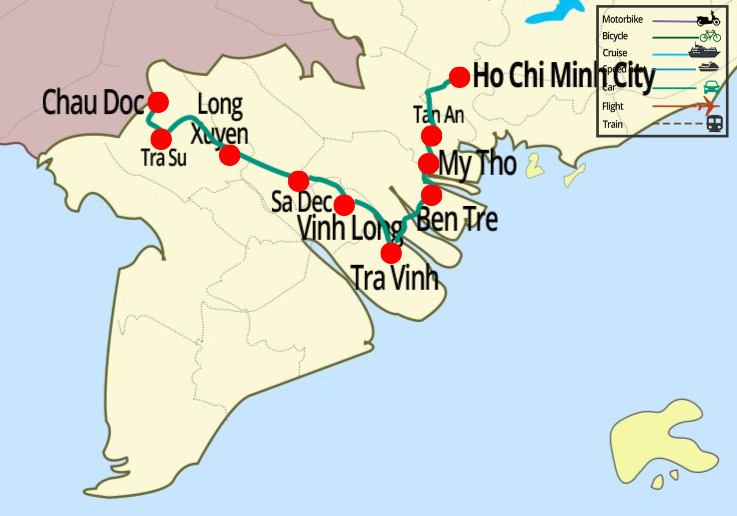
Extensions from the Mekong Delta
For those who have more time, here are several interesting options for extending your discovery of the Mekong Delta. These extensions offer a wealth of experiences, allowing you to deepen your discovery of the region and its surroundings.
Beach vacation in Phu Quoc: For a moment of relaxation on idyllic beaches, take a speedboat from Rach Gia or Ha Tien to Phu Quoc Island. This extension is ideal for combining delta exploration with a seaside holiday. Rach Gia is 110 km from Can Tho and 60 km from Long Xuyen, while the distance between Chau Doc and Ha Tien is 90 km.
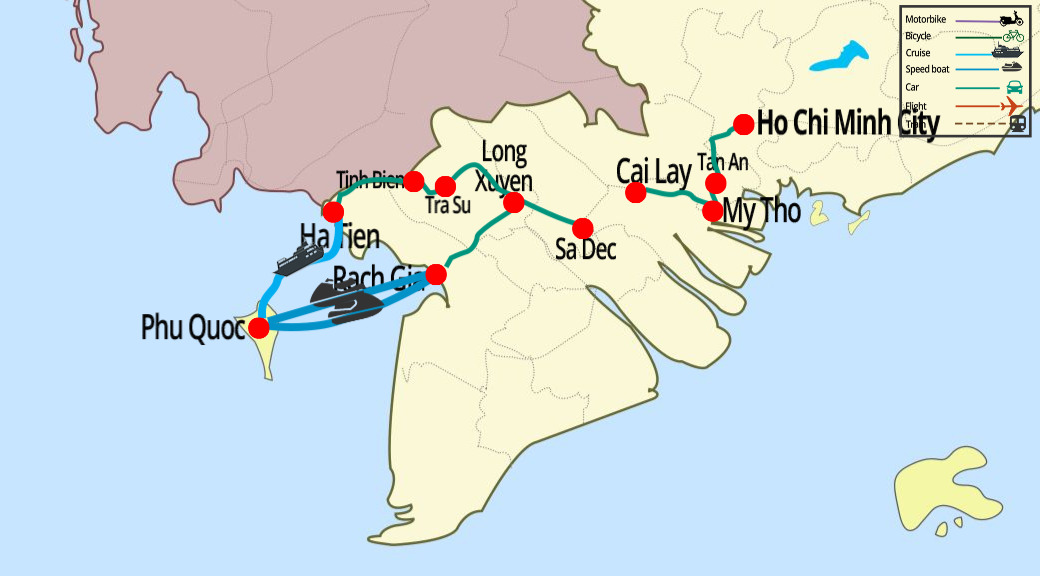
Excursions to Phnom Penh: Boarding from Chau Doc, an exotic adventure awaits you with a 4-hour speedboat trip along the Mekong River to Phnom Penh, the capital of Cambodia. This river journey offers you a unique perspective on the river and a smooth transition to another country.
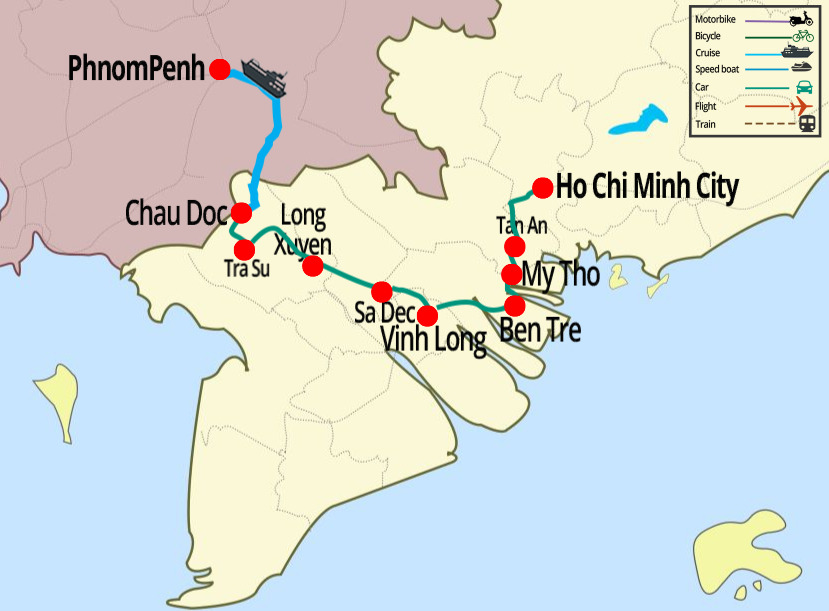
Mekong Delta River Cruise: An Authentic Immersion
A Mekong Delta cruise is a must for anyone wishing to explore this iconic region of Vietnam. Off the beaten track, it offers a unique perspective on the lush landscapes and daily lives of the local people. The lush green orchards, endless rice fields, bustling fish farms, and the famous floating markets are revealed, all while you enjoy the top-notch service abroad a traditional wooden junks or a modern boat.
Discovery and activities during your cruise
Nothing is quite comparable to a cruise to plunge one into the heart of the Mekong Delta. From the deck of your boat, contemplate the picturesque landscapes and lively life that flourishes along the river’s banks. Mekong Delta cruises usually include stops, allowing visitors to explore the villages on foot or by bike, and discover the floating markets, the hub of the region’s commerce.
The thread of French colonial history is revealed along the flow of the Mekong River. Once a commercial eldorado, the former Cochinchina retains traces of its past in the colonial mansions scattered along the river. It was in this region that Marguerite Duras found the inspiration for her famous novel “The Lover”.
Delicate cuisine, freshly made from local produce and carefully prepared by the cruise, is served during the cruise. Each meal is a celebration of the flavours of the delta, offering a delightful culinary immersion in harmony with your journey.
What Cruise to choose?
When it comes to Mekong Delta river cruises, there are a plethora of options to meet your expectations, whether in terms of duration, comfort, or budget.
Private Cruise on a Traditional Sampan
- Song Xanh Sampan: Constructed from wood and bamboo, this traditional sampan promises an immersive and authentic experience. With 2-3 cabins, Song Xanh Sampan guarantees comfort and privacy while cruising through the delta’s intricate canals, far from the crowds.
Price: From $450 per person.
Duration : 2 days/1 night or 3 days/2 nights
Boarding: Cai Be, Can Tho, Rach Gia
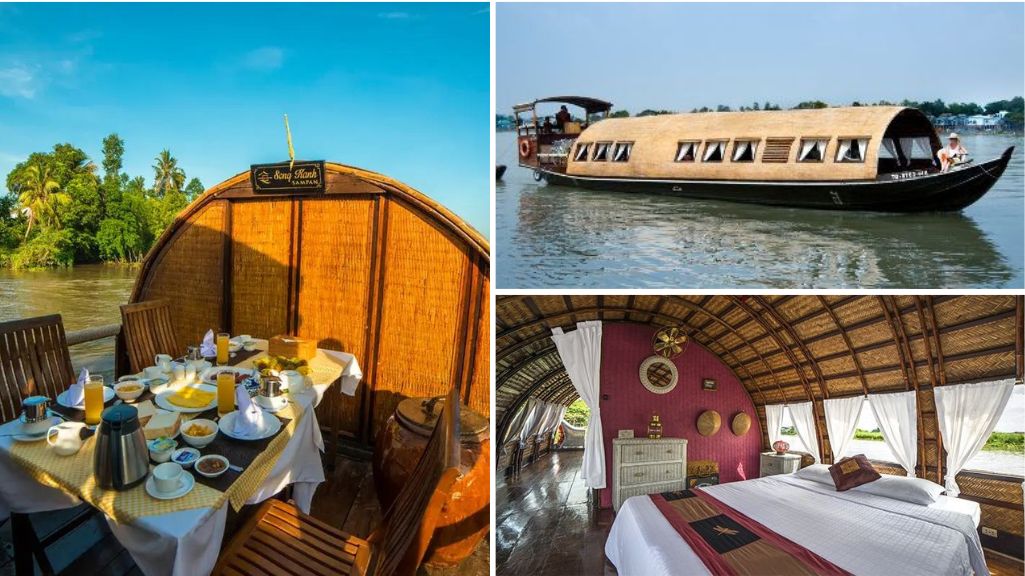
- Mango Cruise: This private cruise provides the exclusivity of a single cabin, complete with a relaxation area and personalized service from an experienced crew.
Price: From $400 per person
Duration: 2 days/1 night or 3 days/2 nights
Boarding: Ben Tre, My Tho, Sa Dec, Can Tho
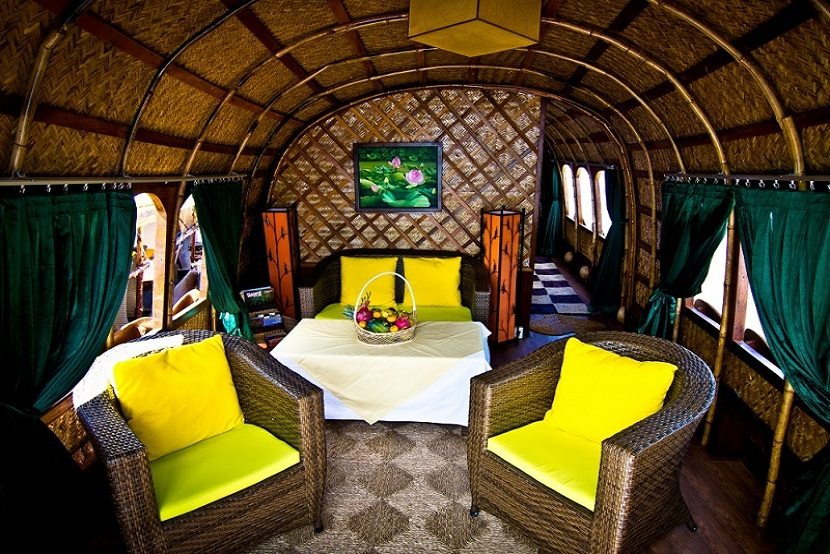
Group Cruise on a luxury boat
For group cruises, travelers will share a spacious boat featuring comfortable, exquisitely appointed cabins. These cruises provide attentive service and refined cuisine inspired by local traditions. Enjoy a journey along the Mekong River, which offers a unique opportunity to explore the cultural and natural richness of the Mekong Delta while creating memorable moments of relaxation.
There are a number of cruise companies that offer itineraries that take you to Phnom Penh, the capital of Cambodia.
Here is our list of recommended cruises:
- Heritage Line: This company proposes two different boats: The Jayavarman, featuring French art deco design with Indochinese touches, and The Jahan, inspired by the opulence of British Indian ships. These boats offer a variety of itineraries ranging from 4 to 8 days, with possible departures from My Tho, Phnom Penh, or Siem Reap.
Price: From $1950 per person.
- Victoria Mekong: This 4-star boat combines elegance and luxury for a memorable cruise, with departures from Ho Chi Minh City, Can Tho, Phnom Penh, or Siem Reap.
Price: From $1000 per person.
- Aqua Mekong Cruise: Crafted by Noor Design, this modern boat takes you on a 4 to 8-day voyage from Ho Chi Minh City or Phnom Penh.
Price: From $4000 per person.
- Avalon Siem Reap Cruise: This elegantly designed boat can accommodate up to 36 guests for an 8-day cruise between Ho Chi Minh City and Phnom Penh.
Price: From $1500 per person.
- RV Tonle Pandaw Cruise: Inspired by the legendary Pandaw II, this boat offers a cruise where luxury and adventure harmoniously combine.
Price: From $700 per person for 8 days/7 nights, with departures from My Tho or Siem Reap.
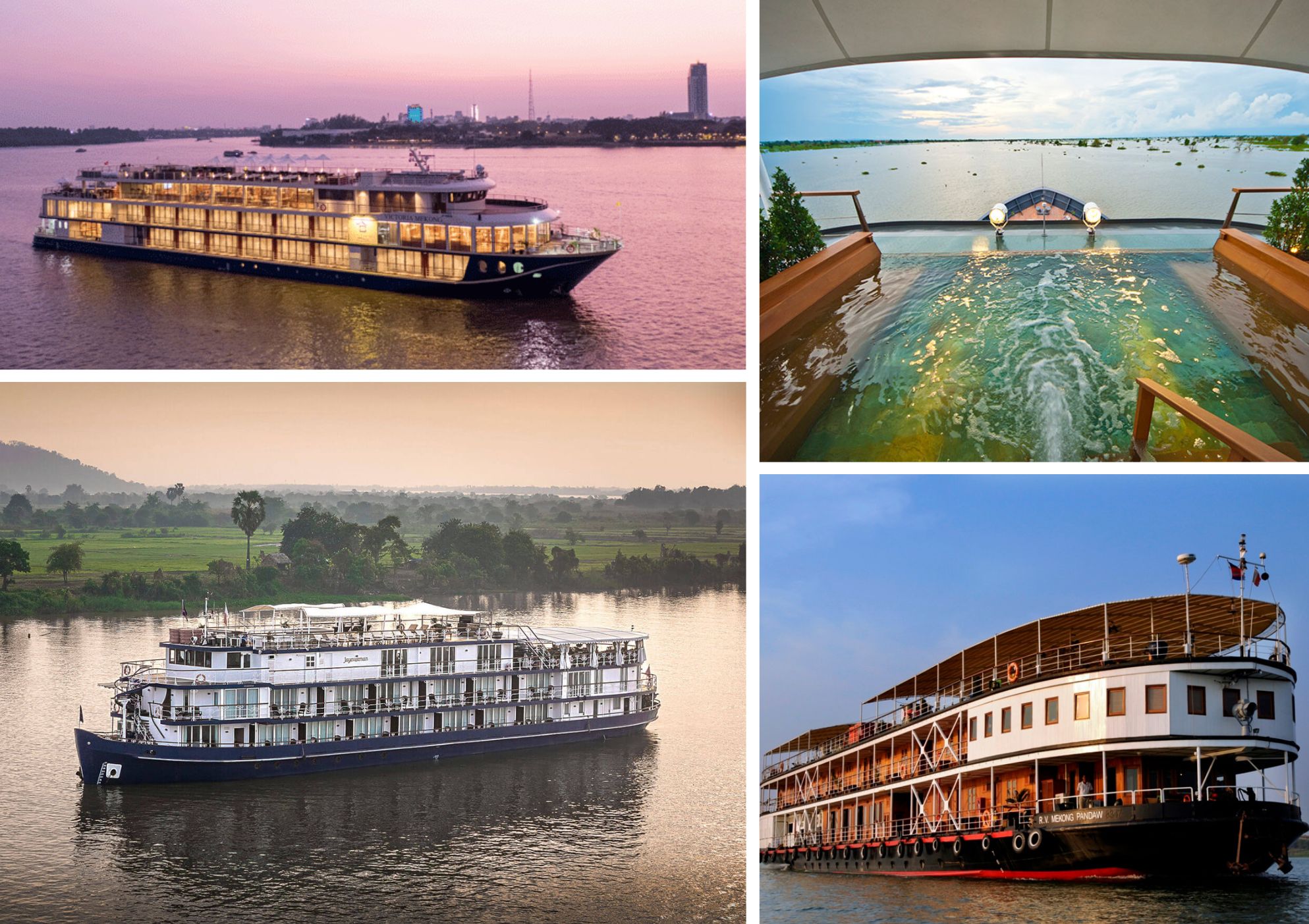
Affordable options:
For tighter budgets, companies such as Bassac, Cochinchine, and Mekong Eyes offer cruises aboard smaller but well-equipped boats. While these cruises focus mainly on the Mekong Delta, they do not include a trip to Cambodia.
Best time to visit the Mekong Delta
The Mekong Delta, an iconic region of southern Vietnam, is renowned for its intricate labyrinth of rivers, canals, and arroyos, forming a unique and captivating landscape. This particular geographical feature allows visitors to enjoy a cool, pleasant climate all year round, providing ideal conditions for exploring the region, taking part in outdoor activities, and discovering the rejuvenating natural environment it has to offer.
Dry Season (November to April): Ideal time to discover the Mekong
The dry season reigns over the Mekong Delta from November to April, offering ideal weather conditions for visitors. During this period, the climate is pleasant, with sunny days and little rainfall, making it the perfect time to explore the many canals, rivers, and floating markets that characterize this iconic region. Visitors can take full advantage of the delta's natural beauty, immerse themselves in the local culture, and take part in a variety of outdoor activities, all under clear skies.
Rainy Season (May to October): A unique adventure in the heart of Mekong
From May to October, the Mekong Delta experiences the rainy season, which is characterized by frequent showers. Fortunately, these rains are often short-lived and concentrate at the end of the day, therefore not hindering tourist activities. This period also coincides with the rising water season, when rivers swell and flood the land, creating a unique, revitalized landscape. Far from being an obstacle, this rising water enriches the soil and offers spectacular scenes of water lilies in bloom, transforming the area into a veritable haven of greenery.
How to get to the Mekong Delta: Travel options
There are numerous ways to reach the Mekong Delta, depending on your preferences and budget.
By road: The delta is easily reached from Ho Chi Minh City (Saigon), Phu Quoc, and even Cambodia. From Ho Chi Minh City, there are buses to the main towns of the delta, such as My Tho, Cai Be, Can Tho, Ben Tre, Vinh Long, Sa Dec, and Long Xuyen. If you're looking for greater comfort and flexibility, a private car will enable you to explore the region at your own pace and discover its hidden treasures.
By Plane: For those departing from Hanoi or Phu Quoc, Vietnam Airlines provides direct flights to Can Tho, the capital of the Delta, facilitating your access to this fascinating region.
By Boat: From Phu Quoc, you can also take a boat to Rach Gia or Ha Tien, two gateways to the delta. For those coming from Cambodia, a four-hour boat ride from Phnom Penh will take you directly to Chau Doc, a town in the heart of the Mekong Delta.
With each season exuding a different charm and rhythm, this land, as does its warm and welcoming inhabitants, invites visitors to come at any time of year. With this compilation, you now have the answers to your big questions “How to visit the Mekong Delta?”, “What to see and do in the Mekong Delta?”. So, without further ado, come and discover this region.
If you need more information or advice regarding your trips to Vietnam, don’t hesitate to contact us via this email address or Whatsapp. We are glad and always ready to help you curate your dream vacation that best suits your wishes.
Related articles:
>> Tour to the Mekong Delta: itinerary ideas in 1,2,3,4,5,6 days to know
>> Top 10 unmissable activities in the Mekong Delta
>> Vietnam Tour 2024-2025: Where to go? Which itinerary? What to do? How many days?
 Español
Español Français
Français






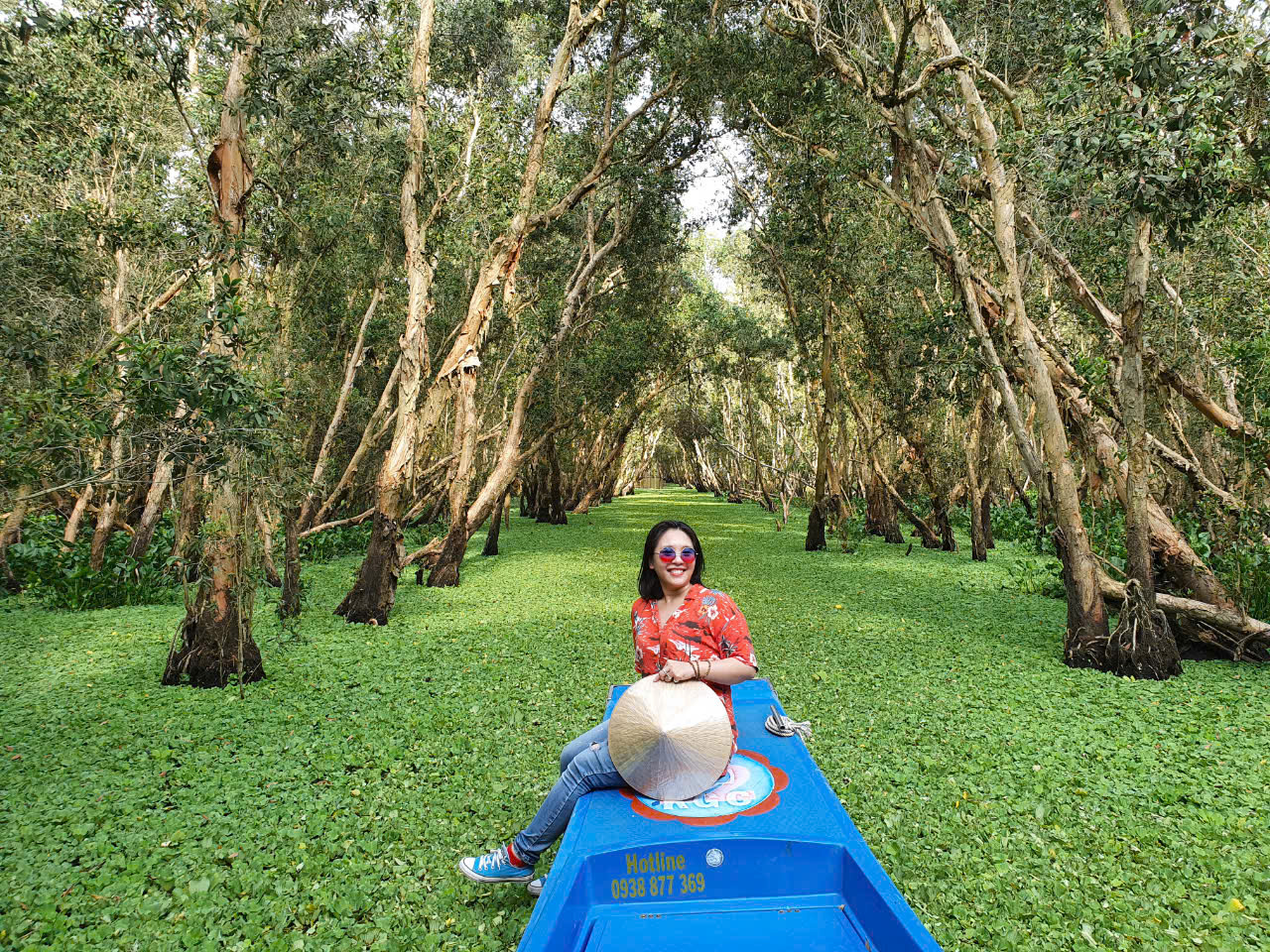
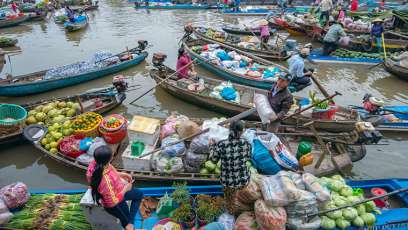
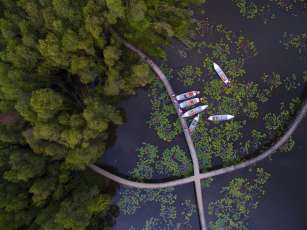
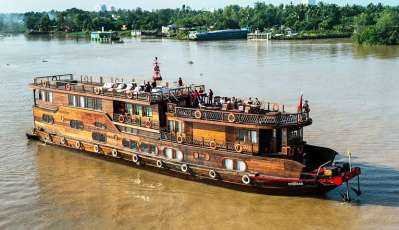
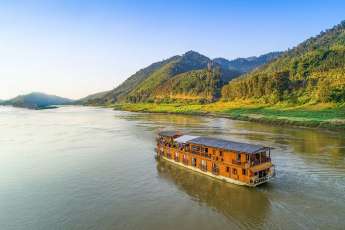
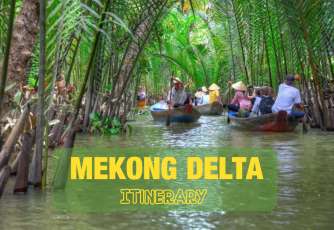
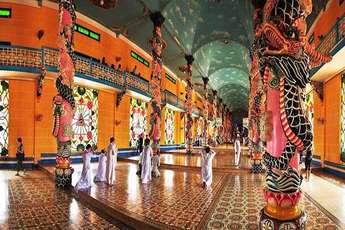

.png)



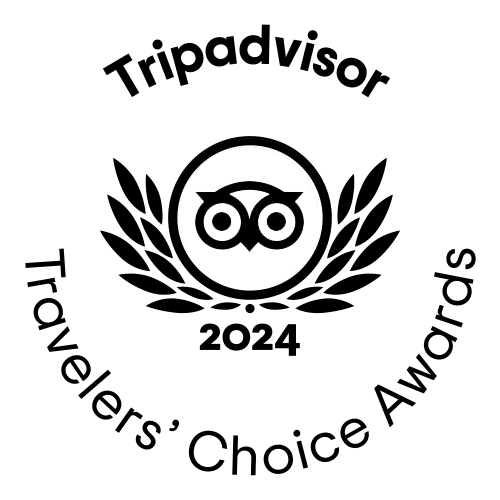

Timothy O Tool
on Feb 23, 2026Timothy William Groh
on Feb 23, 2026TwelmSC
on Feb 20, 2026Morgane Ter Cock
on Dec 18, 2025HerbertPhomaMS
on Oct 19, 2025